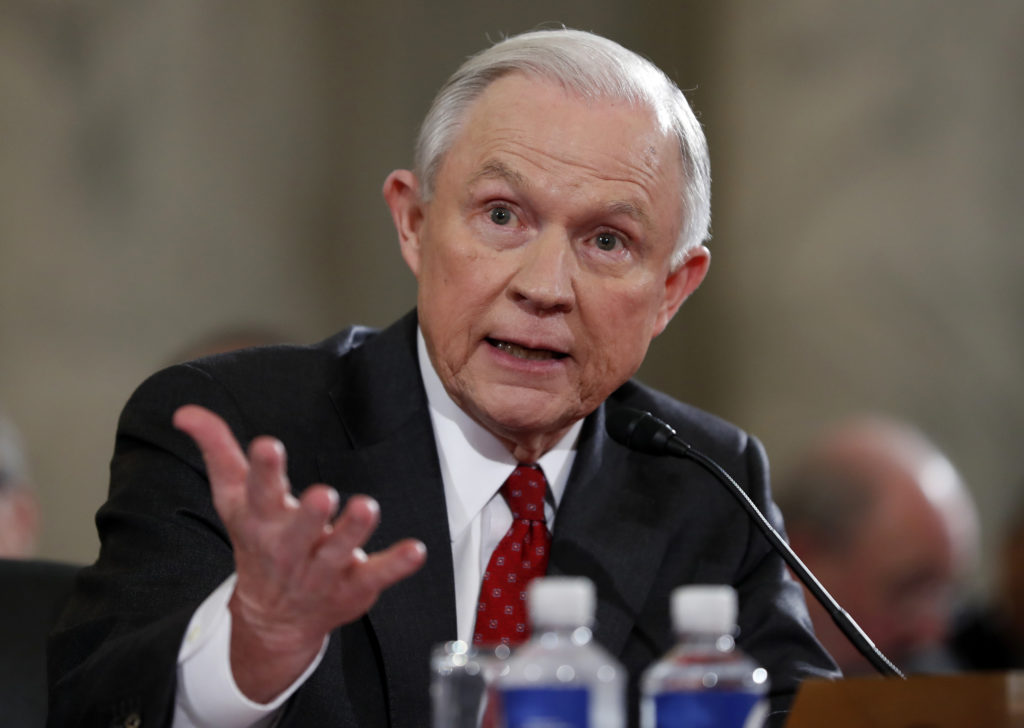Kremlin: Jeff Sessions controversy an impediment to new relations

The intense attention being given to the new U.S. attorney general’s meetings with Russia’s ambassador could obstruct improved Washington-Moscow relations, the spokesman for Russian President Vladimir Putin said Thursday. The spokesman, Dmitry Peskov, told reporters he did not know about the meetings last year between Ambassador Sergei Kislyak and Jeff Sessions, who at that time was a U.S. senator. Sessions also was a policy adviser to President Donald Trump’s campaign. News of the two meetings has added fuel to the controversy over whether Russia was improperly involved with Trump’s campaign. It spurred calls in Congress for Sessions to recuse himself from an investigation into alleged Russian interference in the U.S. presidential election. Peskov said it was normal for Russian diplomats to meet with U.S. lawmakers. Sessions’ office has said the meetings were in his capacity as a senator rather than as a Trump campaign adviser. He characterized the reaction to the news of the Sessions meetings as “an emotional atmosphere (that) leads to resistance to the idea of some kind of U.S.-Russia dialogue.” A spokeswoman for the Russian Foreign Ministry, Maria Zakharova, told The Associated Press that the Russian Embassy would not comment on meetings with American political figures, but she also said they were part of the embassy’s “everyday business.” Zakharova echoed Peskov’s assessment in a briefing on Thursday, saying U.S. news media were overreacting to suggestions of improper contacts between Russia and Trump’s circle. “What is happening now in the West, particularly in the U.S. media, it’s just the manifestation of some kind of media vandalism,” she said. Trump has repeatedly said that he wants to improve relations between Moscow and Washington. But Moscow appears frustrated by the lack of visible progress, as well as by the support from Trump administration officials for continuing sanctions imposed on Russia for its interference in Ukraine. Some Russian news media have cast the controversies over Trump and Russia as attempts by the Democratic Party to undermine the Republican Trump’s agenda. But others suggest that Moscow may have been overly hopeful for a swift reversal of longstanding U.S.-Russia tensions. “You still want to stay in this sweet dream called ‘Trump,’ always pushing away unpleasant news from across the ocean like you fumble for an incessant alarm clock and try to turn it off without opening your eyes and staying under the covers,” commentator Sergei Strokan wrote in the business-focused newspaper Kommersant. Republished with permission of The Associated Press.
Jeff Sessions spoke with Russian envoy in 2016, Justice Dept says

Attorney General Jeff Sessions talked twice with Russia’s ambassador to the United States during the presidential campaign, the Justice Department confirmed, communications that spurred calls in Congress for him to recuse himself from an investigation into Russian interference in the U.S. election. Sessions, an early supporter of President Donald Trump‘s candidacy and a policy adviser to the Republican, did not disclose those discussions at his Senate confirmation hearing in January when asked what he would do if “anyone affiliated” with the campaign had been in contact with officials of the Russian government. Sessions replied that he had not had communications with the Russians. In a statement late Wednesday, Sessions said, “I never met with any Russian officials to discuss issues of the campaign. I have no idea what this allegation is about. It is false.” Justice Department spokeswoman Sarah Isgur Flores said Wednesday night that “there was absolutely nothing misleading about his answer.” That statement did not satisfy Democrats, who even before Wednesday had sought his recusal from the ongoing federal investigation and had raised questions about whether he could properly oversee the probe. Sessions said Thursday in a brief interview with NBC, “I have said that, when it’s appropriate, I will recuse myself.” White House spokeswoman Sarah Huckabee Sanders earlier called the disclosure of the talks with the ambassador, Sergey Kislyak, “the latest attack against the Trump administration by partisan Democrats.” She added that Sessions “met with the ambassador in an official capacity as a member of the Senate Armed Services Committee, which is entirely consistent with his testimony.” House Democratic leader Nancy Pelosi accused Sessions of “lying under oath” and demanded that he resign. Other Democrats called on him to step aside from the investigation. House Majority Leader Kevin McCarthy, appearing Thursday on MSNBC’s “Morning Joe” show, “I just think he needs to clarify what these meetings were.” The California Republican said it isn’t unusual for members of Congress to meet with ambassadors, but he added that if a question arose about the integrity of a federal investigation, “I think it’d be easier” for an attorney general to step away from the probe. Sessions had more than 25 conversations with foreign ambassadors last year in his role as a U.S. senator and senior member of the Armed Services Committee, and had two separate interactions with Kislyak, the department confirmed. One was a visit in September in his capacity as a senator, similar to meetings with envoys from Britain, China, Germany and other nations, the department said. The other occurred in a group setting following a Heritage Foundation speech that Sessions gave during the summer, when several ambassadors — including the Russian ambassador — approached Sessions after the talk as he was leaving the stage. Revelations of the contacts, first reported by The Washington Post, came amid a disclosure by three administration officials that White House lawyers have instructed aides to Trump to preserve materials that could be connected to Russian meddling in the American political process. The officials who confirmed that staffers were instructed to comply with preservation-of-materials directions did so on condition of anonymity because they were not authorized to publicly disclose the memo from White House counsel Don McGahn. On the Sessions revelation, Rep. Adam Schiff of California, the top Democrat on the House Intelligence Committee, said: “If reports are accurate that Attorney General Sessions — a prominent surrogate for Donald Trump — met with Ambassador Kislyak during the campaign, and failed to disclose this fact during his confirmation, it is essential that he recuse himself from any role in the investigation of Trump campaign ties to the Russians.” Asked by reporters Monday about the prospect of a recusal, Sessions had said, “I would recuse myself from anything that I should recuse myself on.” At the confirmation hearing in January, Sen. Al Franken of Minnesota asked Sessions about allegations of contact between Russia and Trump aides during the 2016 election. He asked Sessions what he would do if there were evidence that anyone from the Trump campaign had been in touch with the Russian government during the campaign. Sessions replied he was “unaware of those activities.” Then he added: “I have been called a surrogate at a time or two in that campaign and I didn’t have, did not have communications with the Russians, and I’m unable to comment on it.” Flores, the Justice Department spokeswoman, said that response was not misleading. “He was asked during the hearing about communications between Russia and the Trump campaign — not about meetings he took as a senator and a member of the Armed Services Committee,” she said in a statement. Franken said in a statement he was troubled that the new attorney general’s response to his question was “at best, misleading.” He said he planned to press Sessions on his contact with Russia. “It’s clearer than ever now that the attorney general cannot, in good faith, oversee an investigation at the Department of Justice and the FBI of the Trump-Russia connection, and he must recuse himself immediately,” Franken said. Separately in January, Sen. Patrick Leahy, a Judiciary Committee Democrat, asked Sessions in a written questionnaire whether “he had been in contact with anyone connected to any part of the Russian government about the 2016 election, either before or after election day.” Sessions replied simply, “No.” Republished with permission of The Associated Press.
Donald Trump to push Pentagon upgrade aboard US aircraft carrier

Embracing a stronger defense, President Donald Trump intends to meet with sailors and shipbuilders on an aircraft carrier in Virginia to promote his plans for a major military buildup. Trump is traveling Thursday to Newport News to deliver a speech aboard the Gerald R. Ford, a $12.9 billion warship that is expected to be commissioned this year after cost overruns and delays. He also is meeting with the carrier’s builder. A draft budget plan released earlier this week by the White House would add $54 billion to the Pentagon’s projected budget, a 10 percent increase. “To keep America safe, we must provide the men and women of the United States military with the tools they need to prevent war,” Trump said in his address to Congress on Tuesday night. Trump, in his 2016 campaign, repeatedly pledged to rebuild what he called the nation’s “depleted” military and told supporters at Regent University in Virginia Beach in October that the region’s naval installations would be “right at the center of the action with the building of new ships.” He often argued that the U.S. military is too small to accomplish its missions and pledged to put the Navy on track to increase its active-duty fleet to 350 ships, compared to the current Navy plan of growing from 272 ships to 308 sometime after 2020. The PCU Gerald R. Ford CVN 78, located at Newport News Shipbuilding, will be the first of the Navy’s next generation of aircraft carriers and is expected to accommodate some 2,600 sailors. Trump’s speech to a joint session of Congress, his first as president, included his past calls for repealing the “defense sequester,” or across-the-board budget cuts instituted by Congress. He will need the repeal to achieve the kinds of increased defense spending that he is seeking. Republished with permission of The Associated Press.


